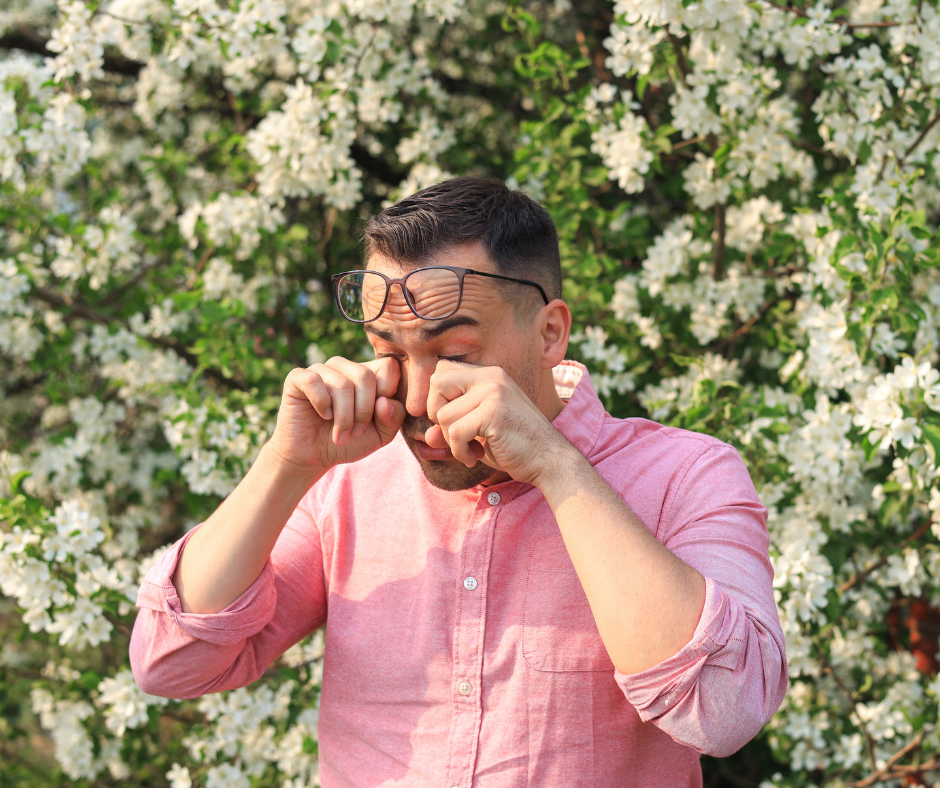Management of Eye Allergies
May is National Asthma and Allergy Awareness Month. For many people, moving into the warmer weather increases allergy symptoms.
Many common allergy symptoms involve the eyes, but eye allergies don’t only occur in the spring. Some people are sensitive to environmental triggers that occur in the summer or fall as well. Or all year round.
When allergies occur year-round, it’s often due to indoor allergens. Read on as we take a look at eye allergy symptoms, treatment, and prevention.
What causes eye allergies?
Allergies occur when your body responds to a substance as if it were harmful. The substance, which is called an allergen, could be anything such as pollen, dust, grass, or food.
As your body tries to fight the substance, your immune system releases antibodies. The antibodies bind to mast cell in the bloodstream and in the tissues of the body. When your body comes in contact with the allergen, the mast cells release histamine. It is histamine that causes many of the well-known eye allergy symptoms.
Common symptoms
Symptoms of eye allergies often start as soon as you have contact with the allergen. Symptoms may include:
• Itchiness
• Tearing
• Burning
• Redness
• Sensitivity to light
• Swollen, puffy eyelids
Some people may also develop symptoms unrelated to the eyes, such as sneezing, running nose, and wheezing when allergies involve the respiratory tree.
Managing and treating eye allergies
Although eye allergies often do not interfere with vision, they can still be annoying and uncomfortable. Fortunately, there are several things you can do to ease eye allergy symptoms, including the following:
Wear sunglasses outside: Sunglasses may block some of the substances, such as pollen, from getting in your eyes. Make sure they wraparound your face. Flat front glasses do little to prevent allergens from entering your eyes.
Rinse out your eyes: For outdoor allergens, as soon as you come in from outside, wash your face. Also, rinse your eyes well with cool water to get the pollen out.
Apply an ice pack: Ice can decrease swelling and mediate the release of histamine into the eye structures from the bloodstream.
Use artificial tears: Artificial tears can ease some of the soreness and discomfort due to eye allergies. Artificial tears may also rinse some of the allergens out of your eyes.
Consider eye drops: Various types of medicated eye drops are available that may help ease symptoms. Some types of drops may only be available with a prescription. For example, steroid eye drops help decrease inflammation. Prescription eye drops may have side effects and should only be used under the direction of a doctor.
Take an oral antihistamine: Oral antihistamines block the release of histamine and help prevent allergy symptoms, such as itchy eyes. Oral allergy medication may not be right for everyone. Oral antihistamines also may have side effects, such as an increase dry eyes.
Consider allergy shots: Allergy shots may be an option if eye allergy symptoms are severe. Allergy shots work by gradually introducing the allergen to your immune system through a series of injections. These help by desensitizing your body to the allergen and reducing the allergic response.
Prevention
The best way to deal with eye allergies is to stop them before they start. Consider the following prevention tips:
Keep track of symptoms: By keeping track of when symptoms occur, you may be able to identify allergens. Once you determine what is causing symptoms, you can develop ways to reduce exposure.
Keep pollen at bay: If you are allergic to pollen, be sure to limit exposure. For instance, keep windows and doors closed on days the pollen count is high. Change your bedding and wash it in hot water frequently. Also, avoid outdoor activities in the morning when pollen counts tend to be the highest. Using an HVAC system with a well-maintained and frequently replaced filter is most appropriate during allergy season.
Limit mold growth: Mold is a common allergy trigger. Use a dehumidifier to help reduce mold growth inside. Additionally, wear a HEPA filter mask when doing yard work to reduce exposure to mold outdoors. Thoroughly clean or change your shower liner frequently.
Use a HEPA filter: Consider using a HEPA filter in your home to reduce common indoor allergens.
We hope the information helps you keep your eyes allergy-free.
If not, an appointment with Dr. Vale might be needed. Give us a call!

Comments are closed